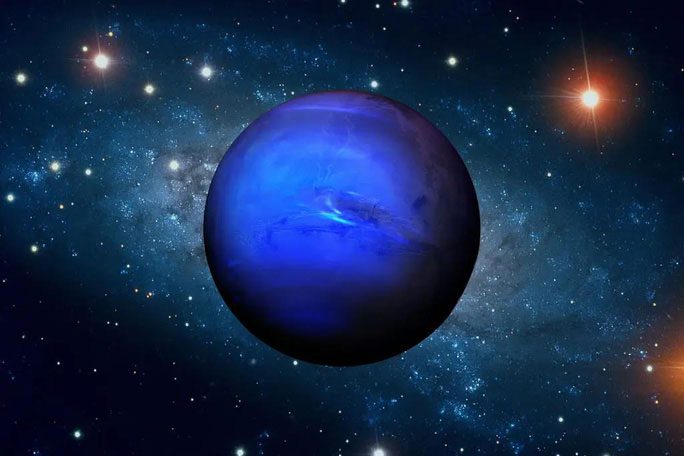Six powerful telescopes have turned their gaze towards the cold and mysterious sibling of Earth, uncovering some truly bizarre phenomena occurring on this planet.
While the mysteries of strange climates on many exoplanets have been revealed, what is truly happening on Neptune, a planet located right within our Solar System, remains an intriguing puzzle for astronomers.
With a distance of 4.5 billion km, a constant temperature of around -220 degrees Celsius, and enveloped in darkness, observing the eighth planet in the Solar System from Earth is extremely challenging.

Neptune – (Graphic image from NASA data).
According to Sci-News, a research team led by astronomer Michael Roman from the University of Leicester (UK) and colleagues studied this unique planet using data synthesized from the Very Large Telescope (VLT) of the European Southern Observatory (ESO), NASA’s Spitzer Space Telescope, two Subaru telescopes, Keck and North Gemini in Hawaii, USA, and the South Gemini Telescope in Chile.
Summer in the Southern Hemisphere of Neptune has been ongoing since 2005 and will continue until 2045. As the farthest planet from the Sun, its orbit is exceptionally large. A year here is equivalent to 165 Earth years, which means a single season lasts over four decades.
Scientists have been studying the infrared light emitted from Neptune’s stratosphere, only to be astonished to find that it is… getting colder after nearly two decades of what is termed “summer.”
Specifically, according to Science Alert, the average temperature of this planet has dropped by about 8 degrees since 2003, with the last comprehensive measurement recorded in 2018.
In contrast, the southern pole of the planet has warmed significantly, increasing by up to 11 degrees from 2018 to 2020.
The authors are still uncertain about the exact cause of the “cold summer” and the sudden heating of the southern pole. They speculate that it may be due to complex chemical changes in the stratosphere or the entire atmosphere, or random and more complex weather patterns than any other planet in the Solar System.
Research will continue as Neptune remains an attractive target for astronomers. Although it is cold and seemingly lifeless, NASA suspects there may be an underground ocean beneath the icy crust of this planet.
The study was recently published in the journal Planetary Science Journal.


















































